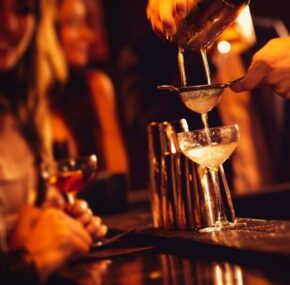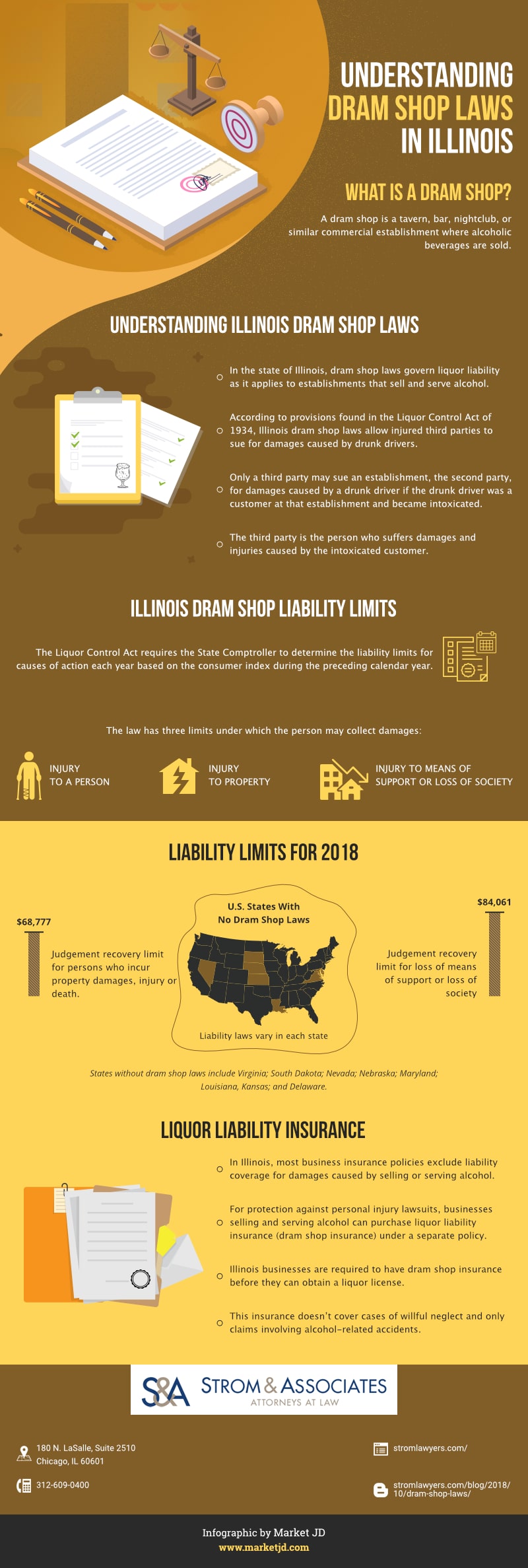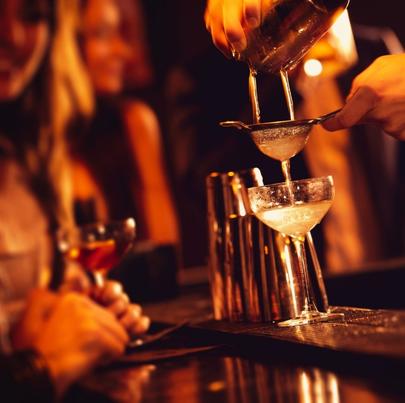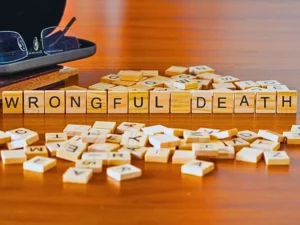
Understanding Dram shop laws in Illinois can be a bit tricky. If you have been injured by an intoxicated person, you can bring a personal injury lawsuit against that person directly. In some states, you can bring a civil lawsuit against the vendor who sold alcohol to the intoxicated person for any injury caused by him or her. This law is known as the dram shop law. If you have been injured by an intoxicated person in Illinois, you may want to consult a Chicago Dram shop lawyer.
Understanding Dram Shop Laws
Dram shops are any type of establishment that serves alcohol. So, can a bar be held liable for a drunk driver? The answer is yes. Dram shop laws apply to establishments such as pubs, bars, and any other establishment where alcohol is served.
If you have been injured by a person who has consumed alcohol, you may be able to pursue a claim for damages against the person who injured you with help from a Chicago dram shop liability attorney. Illinois dram shop laws allow an injured person to pursue damages against the patron who served alcohol to the intoxicated person who then caused the injury.
These laws exist to discourage vendors from serving alcohol to people who may then go out and harm other people, such as when driving. No amount of alcohol is safe when driving.
In most states, dram shop laws apply to vendors who did wrong by serving underage persons or selling alcohol to a visibly intoxicated person. In Illinois, however, dram shop laws permit you to hold the vendors liable regardless of whether there was any wrongdoing on their part.
So, if a person goes to a bar, consumes alcohol, and then goes driving and has an accident with you, who are entitled to claim damages directly against the person who caused the accident. Under Illinois dram shop laws, you will also be entitled to claim against the bar that sold the alcohol.
Dram shop laws apply to vendors who provide alcohol commercially. They do not apply to hosts who provide alcohol at social events such as parties or social gatherings.
Under dram shop laws in Illinois, third parties can sue establishments that sell and serve liquor for damages caused by drunk driving accidents, if the driver was served alcohol at that establishment.
______
Understanding Illinois Dram Shop Laws
A dram shop is a tavern, bar, nightclub, or similar commercial establishment where alcoholic beverages are sold. In the state of Illinois, dram shop laws govern liquor liability as it applies to establishments that sell and serve alcohol. Illinois law states that only a third party may sue an establishment, the second party, for damages caused by a drunk driver if the drunk driver was a customer at that establishment and became intoxicated. The third party is the person who suffers damages and injuries caused by the intoxicated customer.
According to provisions found in the Liquor Control Act of 1934, Illinois dram shop laws allow injured third parties to sue for damages caused by drunk drivers. The Liquor Control Act requires the State Comptroller to determine the liability limits for causes of action each year based on the consumer index during the preceding calendar year. The law has three limits under which the person may collect damages: injury to a person; injury to property; and injury to means of support or loss of society.
(Article continues below infographic)

Illinois Dram Shop Liability Limits for 2018:
- For causes of action that involve persons who incur property damages, injuries, or death, the judgment recovery shall not exceed $68,777.44 for each person.
- For causes of action that involve either loss of means of support or loss of society resulting from the injury or death of any person, the judgment recovery shall not exceed $84,061.32.
Dram shop laws make businesses that sell and serve alcoholic beverages to customers liable in cases where intoxicated customers cause harm to another person/persons after they leave that business. Currently, dram shop laws exist in 43 states, but liability laws vary in each state. States without dram shop laws include Virginia; South Dakota; Nevada; Nebraska; Maryland; Louisiana, Kansas; and Delaware.
In Illinois, most business insurance policies exclude liability coverage for damages caused by selling or serving alcohol. For protection against personal injury lawsuits, businesses that sell and serve alcohol can purchase liquor liability insurance (dram shop insurance) under a separate policy. Illinois businesses are required to have dram shop insurance before they can obtain a liquor license. This insurance doesn’t cover cases of willful neglect, only claims involving alcohol-related accidents.
Liability Limits
Illinois law permits you to claim damages under dram shop laws for two situations. You may seek dram shop damages for your personal injury as the victim or loss of companionship. You can also seek compensation as support from the victim’s injury or death, if the victim was a family member of yours. Illinois sets a cap on the vendor’s liability, which it adjusts regularly. Currently, the liability limits in Illinois permit you to claim up to $77,787.30 for injury, death, or property damage for each person suffering damages. For loss of support or companionship resulting from injury or death, the cap is $95,073.37.
Proving Fault in a Dram Shop Case
If you want to file a personal injury case with a dram shop attorney in Chicago, you will need to prove the following four elements of fault:
- Proof that the vendor sold alcohol to the intoxicated individual. This can be done using evidence such as receipts either from the bar, restaurant or credit cards, tabs, video footage or witness statements.
- Causation. This means that the intoxicated individual then went on to cause injuries to a third person. It can be established using evidence such as witness statements, police reports, surveillance, etc.
- The was proximate cause between the sale of alcohol and the intoxication. This requires you to show that the vendors selling alcohol led to the individual being intoxicated at the time of the accident. Legally, this requires the intoxicated individual’s blood alcohol content to be more than 0.08.
- The intoxication was the cause of the injuries. The injured person must have suffered injuries or damages because of the intoxication. In Illinois, the law requires that intoxication is the cause of one-third of the injuries suffered.
Do You Have a Dram Shop Case?
If you have been injured in an accident with another person or suffered damages, you may be able to hold the vendor liable. To have this claim, you must prove that the vendor sold alcohol to the person who caused the injury, the alcohol sold contributed to the intoxication and the intoxication was the material cause of your injuries.
Every case is different and must rely on facts unique to that case. A Chicago car accident lawyer will help you collect evidence to establish your case. This can include reserving letters as evidence, collecting police reports, contacting potential witnesses, taking depositions and issuing subpoenas if a lawsuit is filed.
You will want to provide evidence showing that the person was intoxicated, but the vendor continued serving him or her alcohol. Alternatively, the person was likely to become intoxicated due to the amount of alcohol served, but served him or her anyway. Dram shop laws apply to vendors selling alcohol to minors, so the vendor will be liable for selling without requesting proof of age. Finally, if a vendor sells alcohol to the person after normal closing hours.
Statute of Limitations
A statute of limitations sets a time limit within which you can start legal proceedings. If the time limit has passed in terms of the statute of limitations, you are not able to bring your claim. The statute of limitations for a personal injury case in Illinois is two years from the time of the accident. With dram shop laws, however, that statute of limitations is shorter at one year. So, if you suffered damages from an accident within the past year, you may still have a claim.
Defenses
There may be certain defenses on which a defendant can rely to refute a dram shop claim.
One of these is complicity, meaning that the injured person was complicit in, or contributed to, the intoxication of the person. So, if you went to a bar with a friend, and brought your friend some alcohol before leaving, your friend could claim the defense of complicity. This applies if the injured person actively participated in and encouraged the intoxicated person to consume alcohol.
In cases involving a minor, a vendor can defend itself by proving that it relied on proof of age provided by the minor. If they properly checked proof of age, ad reasonably believed such proof that the minor was an adult, they can use this as a defense.
Finally, a vendor can rely on proof that it was not negligent. This may be the case where the vendor encouraged customers to use taxi or ride-share services rather than driving while intoxicated, or encouraged patrons to appoint a designated driver.
If you have suffered damages in an accident from an intoxicated person within the last year, and do not believe that the vendor has any of the defenses mentioned, you may want to contact a Chicago dram shop liability lawyer. A lawyer will help you gather evidence, establish your case, and advise you on the merits of your claim. They will help you with understanding dram shop laws in Illinois and navigating the legal processes for claiming compensation.







